“Accomplishment will prove to be a journey, not a destination.” – Dwight D. Eisenhower
As the summer ends and the weather turns, the new school year begins. Although the first day varies in different parts of the world, however normal pattern is for school to begin in late August or early September in the northern hemisphere. Berghahn is happy to welcome everyone back with some relevant Education Studies titles.
——————————————————————————————————————–
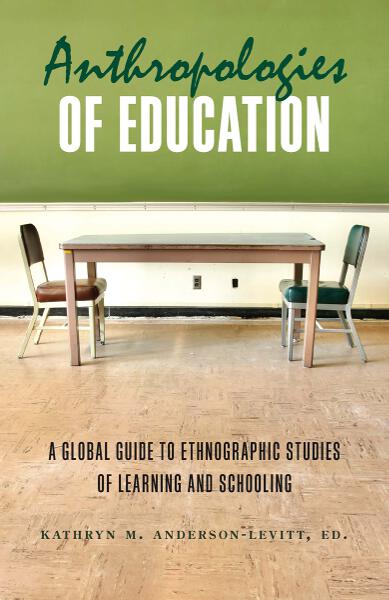 ANTHROPOLOGIES OF EDUCATION
ANTHROPOLOGIES OF EDUCATION
A Global Guide to Ethnographic Studies of Learning and Schooling
Edited by Kathryn M. Anderson-Levitt
Despite international congresses and international journals, anthropologies of education differ significantly around the world. Linguistic barriers constrain the flow of ideas, which results in a vast amount of research on educational anthropology that is not published in English or is difficult for international readers to find. This volume responds to the call to attend to educational research outside the United States and to break out of “metropolitan provincialism.” A guide to the anthropologies and ethnographies of learning and schooling published in German, French, Spanish, Portuguese, Italian, Slavic languages, Japanese, and English as a second language, show how scholars in Latin America, Japan, and elsewhere adapt European, American, and other approaches to create new traditions. As the contributors show, educators draw on different foundational research and different theoretical discussions. Thus, this global survey raises new questions and casts a new light on what has become a too-familiar discipline in the United States.
![]() CONNECTING HISTORIES OF EDUCATION
CONNECTING HISTORIES OF EDUCATION
Transnational and Cross-Cultural Exchanges in (Post)Colonial Education
Edited by Barnita Bagchi, Eckhardt Fuchs and Kate Rousmaniere
The history of education in the modern world is a history of transnational and cross-cultural influence. This collection explores those influences in (post) colonial and indigenous education across different geographical contexts. The authors emphasize how local actors constructed their own adaptation of colonialism, identity, and autonomy, creating a multi-centric and entangled history of modern education. In both formal as well as informal aspects, they demonstrate that transnational and cross-cultural exchanges in education have been characterized by appropriation, re-contextualization, and hybridization, thereby rejecting traditional notions of colonial education as an export of pre-existing metropolitan educational systems.
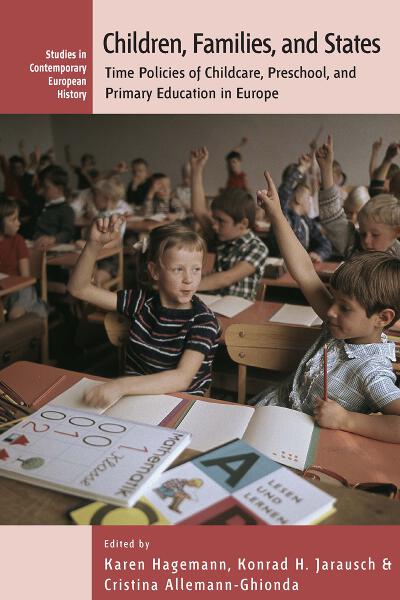 CHILDREN, FAMILIES, AND STATES
CHILDREN, FAMILIES, AND STATES
Time Policies of Childcare, Preschool, and Primary Education in Europe
Edited by Karen Hagemann, Konrad H. Jarausch and Cristina Allemann-Ghionda
Volume 8, Contemporary European History Series
Due to the demand for flexible working hours and employees who are available around the clock, the time patterns of childcare and schooling have increasingly become a political issue. Comparing the development of different “time policies” of half-day and all-day provisions in a variety of Eastern and Western European countries since the end of World War II, this innovative volume brings together internationally known experts from the fields of comparative education, history, and the social and political sciences, and makes a significant contribution to this new interdisciplinary field of comparative study.
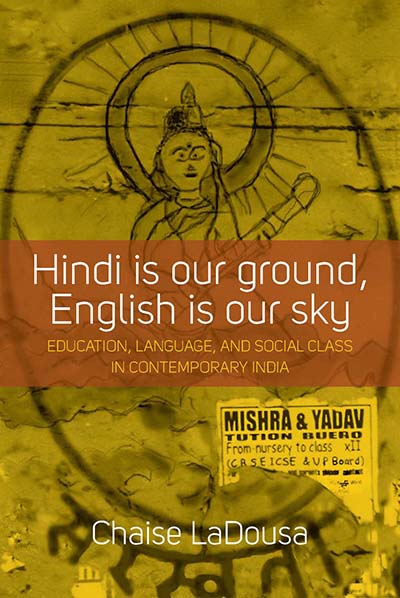 HINDI IS OUR GROUND, ENGLISH IS OUR SKY
HINDI IS OUR GROUND, ENGLISH IS OUR SKY
Education, Language, and Social Class in Contemporary India
Chaise LaDousa
Foreword by Krishna Kumar
A sea change has occurred in the Indian economy in the last three decades, spurring the desire to learn English. Most scholars and media venues have focused on English exclusively for its ties to processes of globalization and the rise of new employment opportunities. The pursuit of class mobility, however, involves Hindi as much as English in the vast Hindi-Belt of northern India. Schools are institutions on which class mobility depends, and they are divided by Hindi and English in the rubric of “medium,” the primary language of pedagogy. This book demonstrates that the school division allows for different visions of what it means to belong to the nation and what is central and peripheral in the nation. It also shows how the language-medium division reverberates unevenly and unequally through the nation, and that schools illustrate the tensions brought on by economic liberalization and middle-class status.
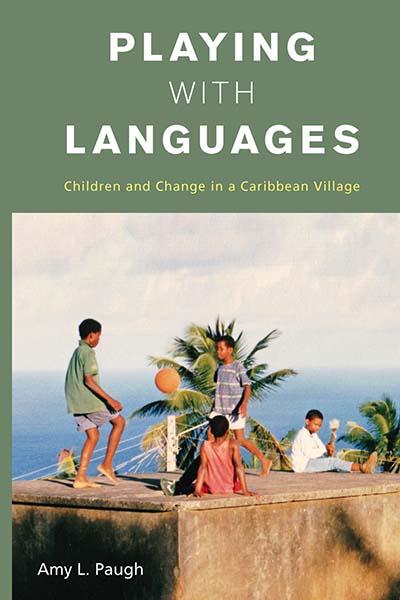 PLAYING WITH LANGUAGES
PLAYING WITH LANGUAGES
Children and Change in a Caribbean Village
Amy L. Paugh
Over several generations villagers of Dominica have been shifting from Patwa, an Afro-French creole, to English, the official language. Despite government efforts at Patwa revitalization and cultural heritage tourism, rural caregivers and teachers prohibit children from speaking Patwa in their presence. Drawing on detailed ethnographic fieldwork and analysis of video-recorded social interaction in naturalistic home, school, village and urban settings, the study explores this paradox and examines the role of children and their social worlds. It offers much-needed insights into the study of language socialization, language shift and Caribbean children’s agency and social lives, contributing to the burgeoning interdisciplinary study of children’s cultures. Further, it demonstrates the critical role played by children in the transmission and transformation of linguistic practices, which ultimately may determine the fate of a language.
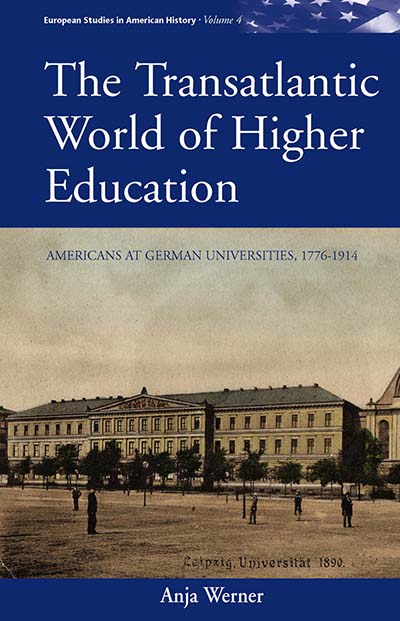 THE TRANSATLANTIC WORLD OF HIGHER EDUCATION
THE TRANSATLANTIC WORLD OF HIGHER EDUCATION
Americans at German Universities, 1776-1914
Anja Werner
Volume 4, European Studies in American History Series
Between the 1760s and 1914, thousands of young Americans crossed the Atlantic to enroll in German-speaking universities, but what was it like to be an American in, for instance, Halle, Heidelberg, Göttingen, or Leipzig? In this book, the author combines a statistical approach with a biographical approach in order to reconstruct the history of these educational pilgrimages and to illustrate the interconnectedness of student migration with educational reforms on both sides of the Atlantic. This detailed account of academic networking in European educational centers highlights the importance of travel for academic and cultural transformations in nineteenth-century America.
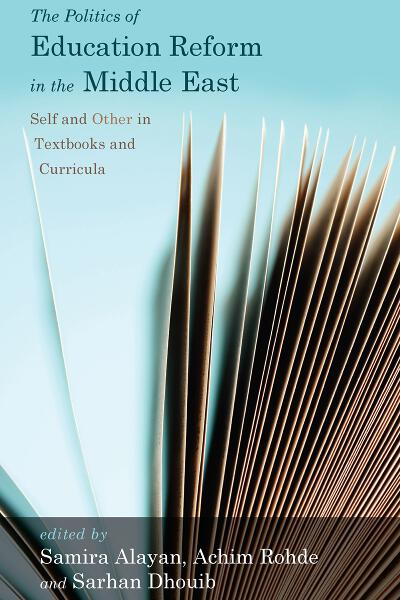 THE POLITICS OF EDUCATION REFORM IN THE MIDDLE EAST
THE POLITICS OF EDUCATION REFORM IN THE MIDDLE EAST
Self and Other in Textbooks and Curricula
Edited by Samira Alayan, Achim Rohde, and Sarhan Dhouib
Education systems and textbooks in selected countries of the Middle East are increasingly the subject of debate. This volume presents and analyzes the major trends as well as the scope and the limits of education reform initiatives undertaken in recent years. In curricula and teaching materials, representations of the “Self” and the “Other” offer insights into the contemporary dynamics of identity politics. By building on a network of scholars working in various countries in the Middle East itself, this book aims to contribute to the evolution of a field of comparative education studies in this region.
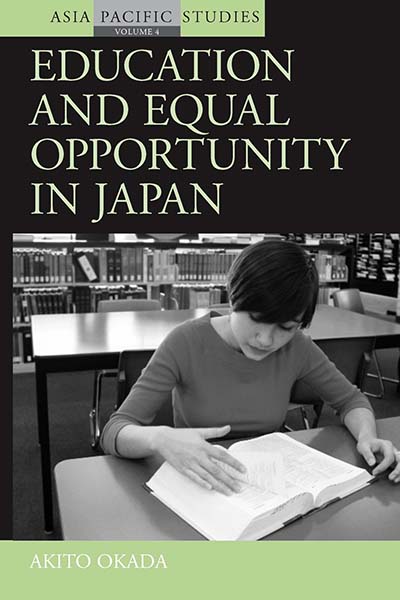
EDUCATION POLICY AND EQUAL OPPORTUNITY IN JAPAN
Akito Okada
Volume 4, Asia-Pacific Studies: Past and Present Series
In many societies today, educational aims or goals are commonly characterized in terms of “equality,” “equal opportunity,” “equal access” or “equal rights,” the underlying assumption being that “equality” in some form is an intelligible and sensible educational ideal. Yet, there are different views and lively debates about what sort of equality should be pursued; in particular, the issue of equality of educational opportunity has served as justification for much of the postwar restructuring of educational systems around the world. The author explores different interpretations of the concept of equality of educational opportunity in Japan, especially as applied to post-World War II educational policies. By focusing on the positions taken by key actors such as the major political parties, central administrative bodies, teachers’ unions, and scholars, he describes how their concepts have developed over time and in what way they relate to the making of educational policy, especially in light of Japan’s falling birthrate and aging society.
——————————————————————————————————————–
From Berghahn Journals:
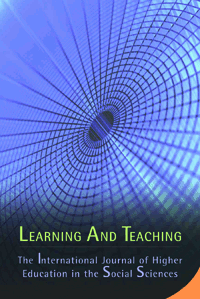 Learning and Teaching
Learning and Teaching
The International Journal of Higher Education in the Social Sciences
Learning and Teaching (LATISS) is a peer-reviewed journal that uses the social sciences to reflect critically on learning and teaching in the changing context of higher education.
The journal invites students and staff to explore their education practices in the light of changes in their institutions, national higher education policies, the strategies of international agencies and developments associated with the so-called international knowledge economy.
The disciplines covered include politics and international relations, anthropology, sociology, criminology, social policy, cultural studies and educational studies. Recent topics include curriculum innovation, students’ academic writing, PhD research ethics, neo-liberalism and academic identity, and marketisation of higher education.
